The Limitations of Riots
Georgia Tech riots do more harm than good
A peaceful vigil for Schultz turned violent when protesters crashed the event Sunday night.
September 26, 2017
“The limitation of riots, moral questions aside, is that they cannot win and their participants know it. Hence, rioting is not revolutionary but reactionary because it invites defeat.” – Martin Luther King Jr.
“Cops, pigs, murderers.” That was the rallying cry echoing over Atlanta on Sept. 17 as protesters swarmed the streets following the heartbreaking death of Scout Schultz. Many of the protesters may have acted on their beliefs peacefully, but this was overshadowed by the excessive violence and hatred seen that night.
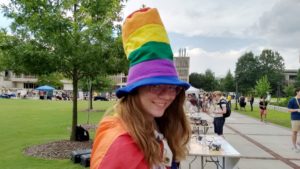
Scout Schultz (pictured), an active member in the Georgia Tech LGBT community, led the Georgia Tech Pride Alliance. Schultz’s death on Sept. 16, 2017, dealt an emotional blow to the on campus LGBT community.
On Sept. 16, Georgia Tech student Scout Schultz was shot and killed in a case of suicide by cop. Schultz was the leader of Georgia Tech’s Pride Alliance, an organization whose goal is to promote equality for the LGBTQ.
At 11:17 p.m., police responded to a call made by Schultz reporting a suspicious figure on campus who was intoxicated as well as wielding a knife and firearm. At 11:30 p.m., police sent an alert to students urging them to seek shelter immediately due to a campus emergency. Police arrived on the scene and for a few minutes tried to negotiate with Schultz, asking them* to place their knife on the ground.
Schultz did not listen and after being told not to move they began advancing toward one of the officers, shouting “Shoot me!” Schultz took a fast step toward one of the officers who then fired on them. Following the shot, Schultz was transported to Grady Hospital where they later died.
At 11:50 p.m., students received an all-clear notification, letting them know it was once again safe to go outside. Following their death, three suicide notes were found in Shultz’s dorm.
The following day, students organized a peaceful vigil for Schultz. However, protesters believed to be affiliated with the AntiFa, a group of far-left protesters known for their use of violence, crashed the vigil. The night erupted into to chaos as two officers were hospitalized.
In a video filmed by a bystander to the events, protesters can be seen fighting with police officers, shouting expletives, and chanting “murderers.” The events of Sunday night changed the narrative from the tragic death of a student in need of help to the murder of a student by a vindictive police force. However, the narrative told by the violent protesters is not at all the truth.
In many ways, the Georgia Tech police force is a model police force. They utilize several social media platforms including Instagram, Snapchat, Twitter, and Reddit. They greet fans at football games and host many public events on campus. The night of the incident the Georgia Tech Police Department sent out several alerts to ensure students were safe and did the same during the riots on Sunday. This type of policing is known as community policing and is characterized by an effort to make regular contact with citizens aside from criminal investigations.

Since Schultz’s death, anti-cop protesters have left graffiti such as this all around campus.
With all that the GTPD does right it is hard to imagine how they could become involved in a tragedy like this. This is the first time the GTPD has ever shot anyone. So what went wrong? How did this police force become the center of an AntiFa protest?
The incident began at a community level. If Schultz received the help they needed, there would have never been a 911 call to begin with. On a university level, another problem is that the GTPD were not supplied tasers by Georgia Tech.
As far as the response goes, it is easy to imagine a perfect scenario after the incident. The officer could have shot Schultz in the leg, or the officers could have attempted to disarm Schultz. However, in the heat of the moment these decisions are harder to make with one’s life, the lives of other students, and the lives of other officers at risk. In the end, the GTPD did their job — they protected the students at Georgia Tech. It is tragic that they could not protect Schultz. If officers received more training for a crisis such as this, Schultz may have lived.
The events of Sept. 16 need to be a learning experience, but instead, there are riots moving the focus away from Schultz and toward the police officer. A villain is being edited into a story where there was never meant to be a villain. Changes can save the lives of other people in positions like Schultz, but riots will only slow down the progress of working toward a better tomorrow.
Riots are unavailing, think of it as shouting at a river to change direction. You can throw twigs at the river and shout as many expletives as you like, but unless you get in the river and build a dam it will never budge.
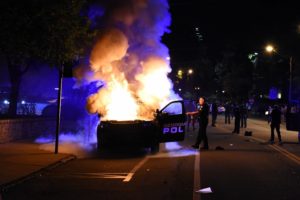
Protesters hospitalized two police officers and burned a GTPD vehicle during a peaceful vigil to remember Schultz. Instead of working toward a better, more peaceful resolution to incidents such as the one involving Schultz, protesters seek a scapegoat.
What if instead of burning cars, protesters started a campaign for Georgia to mandate that all officers carry tasers when on duty? If all officers carried tasers the potentially lethal force of a gun would not be utilized as often. What if instead of spouting hate at police officers doing their best to protect students, protesters showed love to those like Schultz who need it?
If students struggling with suicide receive the help they need, no one will ever have to reach to such extremes again. What if instead of assaulting police officers the community came together to make sure something like this never happens again? A divided people will not be enough to solve this problem, there needs to be cooperation from both citizens and officers.
There are many factors that led to the unfortunate death of Scout Schultz, but burning police cars is not the way to honor a student who was the leader of the Georgia Tech Pride Alliance, a loving organization by nature. Protesters need to stop assigning blame and instead plan improvements for the systems that failed that night. The GTPD aren’t murderers, and Schultz’s death should not be treated as a political agenda. It is time to stop shouting at the river and instead as a community build a dam, but if the violence does not stop, such change will never be possible.
For more information on the events that occurred Saturday, an article with a video of the incident attached can be viewed at this link.
*Scout Schultz identified as non-binary. To respect Schultz’s memory and role in the Georgia Tech Pride Alliance, the non-binary pronouns “they” and “them” are used in place of the typical “he” and “him” throughout the article.



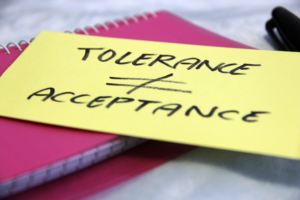
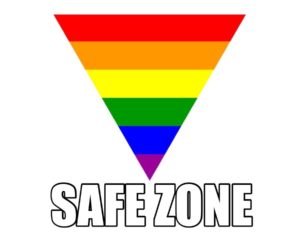
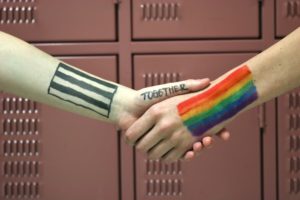



Teresa Samson • Oct 13, 2017 at 5:46 pm
Great article Brock!
MJ Shubert • Oct 8, 2017 at 3:47 pm
Well said.